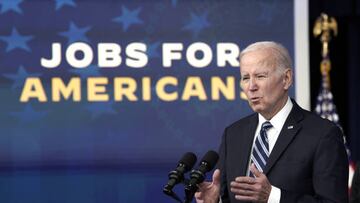2023 State of the Union: What are the main issues President Biden may speak about? Immigration, economy...
President Biden is set to make his second State of the Union address on Tuesday, what issues is he likely to focus on? economy... healthcare...military


On Tuesday, President Biden will address the nation for his second State of the Union (SOTU).
The annual speech comes at a frustrating and uncertain time for the country.
In the United States, and around the world, communities are mourning Tyre Nicholes, a Black man who was fatally beaten by police in early January. The murder of Tyre Nichols showed that more training, officers of color, body cameras, and public money are not the systemic changes needed to prevent the execution of citizens by law enforcement in the US. At most, President Biden will call on congress to pass the George Floyd Justice and Policing bill.
Internationally, the address takes place weeks before the one-year mark of Russia’s invasion of Ukraine and increasing tensions with the Chinese government. These issues, and many more, will likely receive some attention during tomorrow’s primetime event.
Foreign Policy always gets its space
On China, President Biden is likely to warn Chinese Communist Party officials against messing with the USA. A bit of saber raddling always makes it into these speeches. Comments on the commitment of the US to protect Taiwan’s sovereignty are to be expected.
Russia, and more specifically, President Vladimir Putin, are likely to be mentioned. President Biden will condemn the Russian war of aggression and may also spend some time passing the work of NATO to support Ukraine. Nearly a year into the conflict, peace is far from the horizon, millions have been displaced, thousands of civilians have been injured and killed, and the country’s infrastructure has been obliterated. Most Americans support the US providing assistance to Ukraine, but polls show that the share of the public who think too much aid is being sent is growing.
Immigration
Even with very little movement on comprehensive immigration reform on Capitol Hill taking place, the topic is likely to receive a few minutes in the speech. The president will likely call on Congress to pass the Dream Act and law that would provide a path to citizenship for the eleven million undocumented immigrants whose lives are deeply interwoven into communities across the country.
Legislative accomplishments
The president will likely use the primetime window to raise awareness of some bills passed by Congress. In addition to the Inflation Reduction Act, the CHIPs bill, and the codification of marriage equality for same-sex and inter-racial couples, the president may mention the “Pregnant Worker Fairness Act.”
For too long, working pregnant women and new moms have been denied basic dignities – like bathroom breaks or taking a seat – by their employers.
— President Biden (@POTUS) February 6, 2023
Can you imagine?
I promised to address this – and I kept that promise by signing the Pregnant Workers Fairness Act into law.
This bill did not receive much attention since it was passed as an amendment to the omnibus spending package approved in December. The new law protects pregnant workers by mandating that employers accommodate a wider set of physical limitations and evolving needs that arise when growing a human life.
The Economy - Job growth, low unemployment, and inflation
The state of the union would not be complete without a long section on the economy and kitchen table issues. On social media, the White House has already started testing out some of its messages.
We added more than half a million jobs to our economy in January, exceeding expectations by a long shot.
— President Biden (@POTUS) February 3, 2023
We’re building an America we can take pride in – one where working families have good-paying jobs and more breathing room. pic.twitter.com/jzfzaYbFjQ
A commonly used talking point from the Biden administration has centered on the twelve million jobs created since he took office. Those who mention this fact, or create graphics like the one above, never seem to mention that more than twenty million jobs were lost months before he took office. No other modern president has entered office under such conditions.
However, the 3.4 percent unemployment rate recorded in January is an accomplishment Republicans will have trouble diminishing. Sure, the GOP can point to lower labor force participation, but the low unemployment rate and millions of available jobs mean that those looking for employment are able to find it. The quality and fairness of the compensation and conditions offered to workers by this labor market is a separate affair.
Layoffs in the tech sector and a possible recession
Layoffs in the tech sector, and comments by Federal Reserve Chairmen Jerome Powell that the impacts of the central bank’s rate hikes have yet to be felt, provide additional data points to understand the health of the economy; and both darken the economic forecast.
So far, layoffs have mostly impacted professional class and college-educated workers, who may be able to find a new job with relative ease. With any impact of rate increases yet to be seen and mixed signals in the labor market, the economy is entering a period of economic uncertainty.
However, there is not much for Republicans can offer as comfort when it comes to inflation. In Washington, the Fed’s monetary policy holds bipartisan consensus. Also, say layoffs do increase as a result of higher rates. That does not seem like an environment where ideas like lowering or eliminating the minimum wage or further restricting unemployment benefits would thrive.
Commitments to lower inflation are sure to be made
Inflation continues to be one of President Biden’s most pressing economic problem, and while price growth is slowing, it is still increasing.
Compared to March 2020, prices are on average, fifteen percent higher across goods and services included in the Consumer Price Index.
Since January 2020, on average, families are spending 23.3 percent more at the grocery store, renters are paying 13.6 more for housing, and the price of health insurance has risen almost nine percent. Meanwhile, average wages have fallen by three percent, in real terms, over the same period.
These facts, which come from Biden’s own Labor Department, do not align too well with the message from the White House that “wages are up, inflation is down, and more Americans have health insurance than ever before.”
Wages are up, inflation is down, and more Americans have health insurance than ever before.
— President Biden (@POTUS) February 5, 2023
Workers keep our nation running. It’s about time that our economy works for them.
Sure, wages are up, but only in nominal terms.
Yes, prices fell in January, but they are still up double digits compared to 2020.
As for healthcare, more Americans may be insured, but they are paying the most expensive bill on record for it.
Related stories
President Biden’s speech risks isolating voters if, instead of focusing on the economic hardship being felt across the country, he only promotes his own achievements. The White House understands this, and on Monday, POTUS tweeted, “All told, between higher prices and lower wages, lack of competition between businesses costs the median American household $5,000 a year.”
All told, between higher prices and lower wages, lack of competition between businesses costs the median American household $5,000 a year.
— President Biden (@POTUS) February 5, 2023
I'm building a fairer, more competitive economy that works for working families. pic.twitter.com/ZmFCbfJZ2r
Striking the right tone will be critical for President Biden since this year’s State of the Union will likely be his last major address before announcing his decision on whether to seek another term. A formal announcement has yet to be made, but the president has alluded to running again. As much as the speech is focused on where the state stands, the address is an opportunity to explain what another term could look like —an opportunity team Biden is sure to take advantage of.

